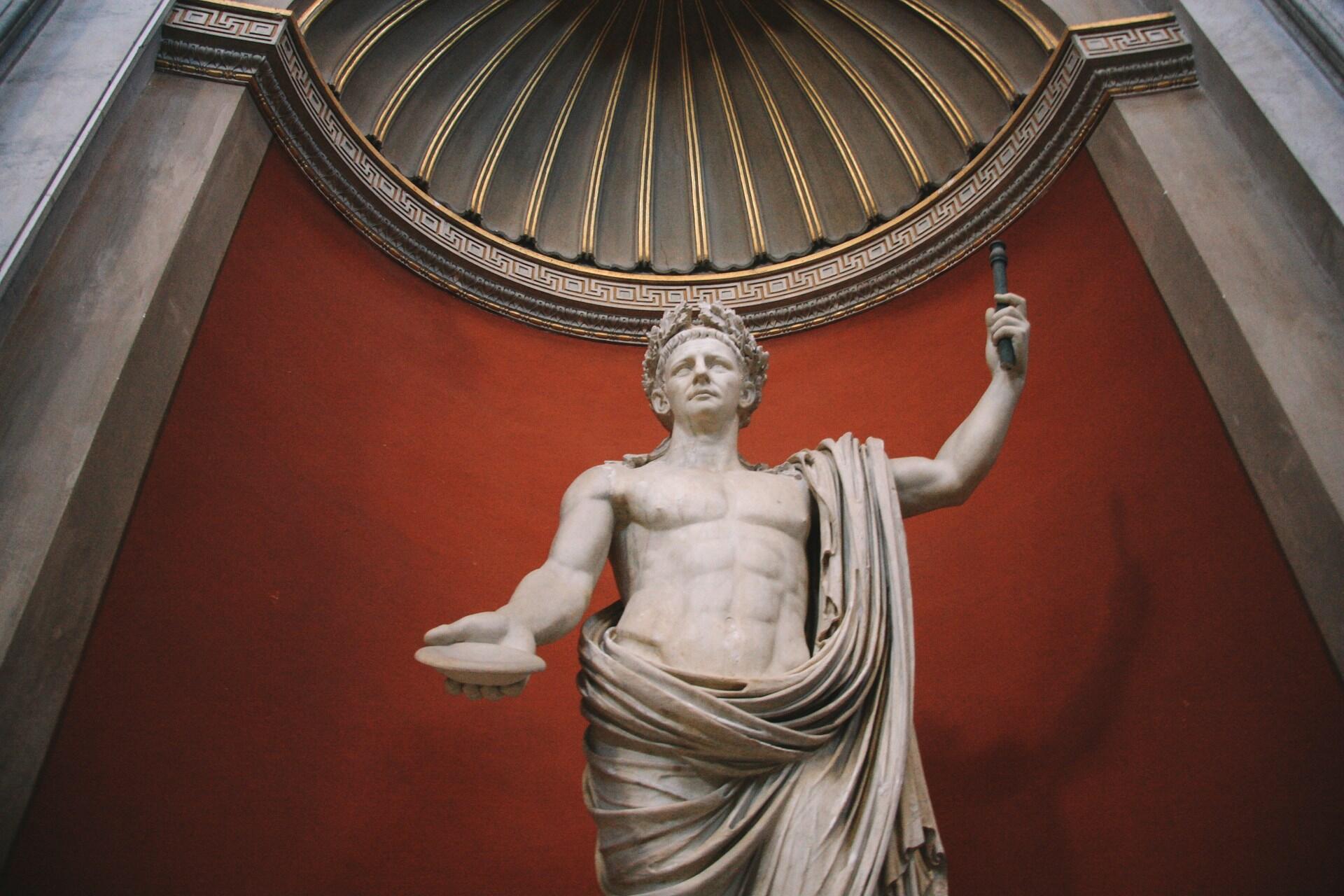Linguists might refer to Latin as a dead language, but much of it survives today, either as translations of expressions, famous quotes, or simply as ideas dating back thousands of years. Whether it's "carpe diem", suggesting that we make the most of the time we have, or the reflection of "Nosce te ipsum", reminding us of self-awareness, there are plenty of Latin quotes that still apply today! These are our favourites, which are yours?

Alea jacta est
The die is cast
Julius Caesar famously said this when crossing the Rubicon River in 49 BCE, defying the Roman Senate. This Latin phrase has endured for two millennia. It remains a reminder that once a decision has been made, there's no turning back.

Ad vitam aeternam
To eternal life
The Latin saying ad vitam aeternam promises life beyond death. It appears in religious texts, funeral rites, and memorial inscriptions. It symbolises the soul's transition into eternity.
of words are derived from Latin.
Amicus Plato, sed magis amica veritas
Plato is my friend, but the truth is a better friend
This phrase was attributed to Aristotle, who claimed that truth must always take precedence over loyalty or personal affection. If you know a thing or two about Plato and Aristotle, then you'll know that this ultimately came from the Greeks. However, it was through Latin that it gained its greatest fame.
Audaces fortuna juvat
Fortune favours the bold
The English version of this is widely used, but it actually originated in Virgil's epic poem. Risk-taking can lead to great rewards, whether in business, art, politics, or just your personal life. This expression, particularly the English translation from Latin, is often chosen as a motto.
speaking a Romance language today.
Aurea mediocritas
The golden mean
This was coined by the Roman poet Horace. This is a Latin phrase that refers to a life of moderation, free from the dangers of either poverty or excess, advocating for quieter and more sustainable ways to live.
Interested in speaking Latin? Find out more in this lecture series with information on the Latin alphabet and more.
Ave, Imperator, morituri te salutant
Hail, Emperor, those who are about to die salute you
This Latin phrase is said to have been shouted by gladiators as they entered the arena. It's often used in historical or cinematic contexts today, where it holds considerable emotional power. It reminds us that while many like to romanticise or idolise Ancient Rome, it could still be a brutal place.

Beati pauperes spiritu
Blessed are the poor in spirit
This is a Latin phrase from the Gospel of Matthew (5:3). It's one of the Beatitudes, a set of teachings in Christian ethics. This expression honours humility and spiritual openness over materialism. It's used in both religious and philosophical contexts as a critique of pride.
Carpe diem
Seize the day
Probably one of the most famous Latin sayings. "Carpe diem" is from a poem by Horace. The whole line is actually "carpe diem, quam minimum credula postero", which means "seize the day, putting as little trust as possible in the future".
The expression has made its way into pop culture, including books, advertisements, and the iconic film Dead Poets Society. It's used colloquially when encouraging people to take a leap, and while the modern equivalent, YOLO, had some time in the sun about a decade ago, it's unlikely that it'll have the staying power of "Carpe diem".
When most people hear "carpe diem", they think of a motivational slogan or a line from a movie. But Horace, who coined the phrase over 2,000 years ago, wasn’t promoting reckless impulse; he was encouraging thoughtful action in the present. His full phrase, carpe diem, quam minimum credula postero, translates to: “Seize the day, putting as little trust as possible in the future.”
It’s a timeless reminder that no one is promised tomorrow, and the best use of your time is to make something of today. That kind of thinking is just as relevant now as it was in the 1st century BCE, maybe even more so.
Cogito, ergo sum
I think, therefore I am
This Latin phrase was coined by the French philosopher René Descartes in the 17th century. It was initially written in French as "Je pense, donc je suis" before later being rendered into Latin as "Cogito, ergo sum".
Beneath the expression lies a beautifully simple yet profound statement. No matter how much we doubt the world, others, or even our own senses, our own existence is evidenced by the fact that we can think.

Deus ex machina
God from the machine
This term originated in Greek and Roman theatre. “Deux ex machina” was a literal device that was used to lower gods onto the stage at critical moments, where they'd usually resolve plot conflicts. Its use evolved and is now used as a way to criticise storytelling that employs sudden and unbelievable resolutions. “Deus ex machina” could be an unexpected event, character, or power that conveniently resolves complicated situations in novels, films, or TV series.
Find out more about the difference between Ecclesiastical Latin and Classical Latin.
Errare humanum est
To err is human
This Latin phrase is widely used in its translated form. It's often used in personal contexts to promote forgiveness, learning, or self-awareness. It also emphasises the value of trial and error while opening the door to compassionate reflection.
Ex nihilo nihil
Nothing comes from nothing
This philosophical Latin phrase was first attributed to Lucretius, a Roman poet and Epicurean philosopher. The full version of the words is "Ex nihilo nihil fit", which means "nothing comes from nothing, nothing ever could." This idea originated in Greek thought and was later echoed by thinkers such as Voltaire.

Fluctuat nec mergitur
(She) is tossed by the waves but does not sink
This is the motto of the city of Paris and has appeared on its coat of arms since the 14th century. It was initially associated with the Guild of Boatmen. For the city, it reflects its resilience in the face of hardship.
Habeas corpus
You shall have the body
This expression is a legal one, and though Latin would evolve into Romance languages, this was codified in English law in 1679, and the full phrase habeas corpus ad subjiciendum means "that you have the body to be subjected [to examination]." It means that a person cannot be held without cause, a cornerstone of democratic freedom. When it comes to civil rights, due process, and state power, this Latin expression helps uphold legal systems in many countries that were influenced by Anglo-Saxon common law.
Although Latin itself is no longer spoken, its legacy endures in the language of millions. Spanish, French, Italian, Portuguese, and Romanian (all Romance languages) evolved directly from the Latin language. Even English, though a Germanic language, borrows over 60% of its vocabulary from Latin and Greek origins.
If you've ever used the words future, century, language, or use, you’re already speaking Latin without knowing it. Studying Latin gives learners a head start when approaching other languages and helps unlock the roots of communication across the world.
Homo homini lupus
Man is a wolf to man
This Latin phrase was first recorded by the Roman playwright Plautus. It's used to express human nature and how people can be as predatory and dangerous to one another as wild animals. It was later adopted and popularised by thinkers like Thomas Hobbes. As a saying, it critiques the darker side of human civilisation. It challenges the idea that humans are naturally kind and rational.
Nosce te ipsum
Know thyself
This Latin phrase was initially translated from the Greek phrase inscribed at the Temple of Apollo in Delphi. To understand the world, you must first understand your own nature. This phrase and its meaning have influenced figures from Socrates to Jung, urging deep self-reflection and awareness.
Panem et circenses
Bread and circuses
This was coined by the Roman satirist Juvenal. It's a criticism of how governments pacify the public with cheap food (panem; bread) and mass entertainment (circenses; circuses) rather than with real civic engagement and solutions. In Roman times, this included gladiator games and grain rations, but it's easy to see how little has changed in 2,000 years. Whether it's political manipulation, media distraction, or consumerism, in the age of the 24-hour news cycles, social media, and endless streaming platforms, panem et circenses still applies.
Quae sunt Caesaris, Caesari
Render unto Caesar what is Caesar’s
This is a Latin phrase that originated in the Gospel of Matthew (22:21). The full quote is "Quae sunt Caesaris, Caesari; et quae sunt Dei, Deo", which is "Render unto Caesar what is Caesar's, and render unto God what is God's". This was Jesus' reply to a trick question and has often been used when emphasising the separation of church and state.
Veto
I forbid
The word "veto" comes from the Roman Republic. Elected tribunes could block or forbid decisions made by the Senate or other magistrates. This legal mechanism was designed to protect the interests of the people from unjust or dangerous legislation.

The idea of “veto” (and the term itself) is now a key part of modern politics and diplomacy. One important example is the United Nations Security Council, where any of the five permanent members can veto a resolution.
Vulnerant omnes, ultima necat
They all wound, and the last kills
This is a Latin expression that regularly features on old sundials and clocks. It's a reminder of the passage of time, suggesting that every passing hour wounds us, with the last hour ultimately being the one that takes our life. While it's perhaps one of the darker Latin expressions we've used here, it's also wonderful in its honesty.
Latin might not be your first thought when it comes to a career, but it plays a huge role in law, medicine, science, philosophy, and even branding. Terms like "in vitro," "et cetera," and "per diem" are widely used in modern contexts. Understanding Latin can help you decode technical jargon, enhance your vocabulary, and make better sense of academic or professional writing.
Whether you're a student of history, a legal mind, or a curious learner, Latin offers a way to reconnect with the classical foundation of today’s professional world, and perhaps open new opportunities for the future.
If you'd like to learn more about Latin (like Latin declensions), consider studying it with a private tutor. You can find private Latin tutors across New Zealand and worldwide on the Superprof website. With most offering the first session for free, you can even try a few before choosing the one that's best for you, your budget, and your learning style. Go on, carpe diem!
| Latin Phrase | English Translation |
|---|---|
| Alea jacta est | The die is cast |
| Ad vitam aeternam | To eternal life |
| Amicus Plato, sed magis amica veritas | Plato is my friend, but the truth is a better friend |
| Audaces fortuna juvat | Fortune favours the bold |
| Aurea mediocritas | The golden mean |
| Ave, Imperator, morituri te salutant | Hail, Emperor, those who are about to die salute you |
| Beati pauperes spiritu | Blessed are the poor in spirit |
| Carpe diem | Seize the day |
| Cogito, ergo sum | I think, therefore I am |
| Deus ex machina | God from the machine |
| Errare humanum est | To err is human |
| Ex nihilo nihil | Nothing comes from nothing |
| Fluctuat nec mergitur | (She) is tossed by the waves but does not sink |
| Habeas corpus | You shall have the body |
| Homo homini lupus | Man is a wolf to man |
| Nosce te ipsum | Know thyself |
| Panem et circenses | Bread and circuses |
| Quae sunt Caesaris, Caesari | Render unto Caesar what is Caesar’s |
| Veto | I forbid |
| Vulnerant omnes, ultima necat | They all wound, and the last kills |
Summarise with AI:















